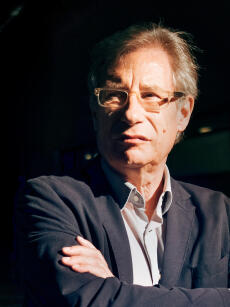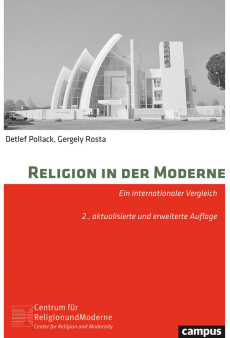Dramatic secularization in the USA and in previous religious strongholds in Europe
Sociologists of religion present one of the most comprehensive empirical studies of religious trends worldwide – Expanded new edition of the standard work Religion and Modernity – Detlef Pollack: Rapid de-churching in the USA, Italy, Poland – “Secularization theory confirmed” – Trend towards belief in a “higher power”
Press release 18 May 2022
According to new research in the sociology of religion, secularization has increased rapidly in the past ten years, even in countries that were previously strongly Christian. “We are observing a rapid de-churching in the USA, Italy and Poland, for example, and a dramatic decline in the importance of religion in many regions of the world”, explains the sociologist of religion Prof. Dr. Detlef Pollack from the University of Münster’s Cluster of Excellence “Religion and Politics”. Together with his colleague Dr. Gergely Rosta, he has just published with Campus Verlag a much expanded and revised new edition of the standard work Religion and Modernity: An International Comparison, which is one of the most comprehensive empirical studies of religious trends from 1945 to the present. “Much has changed recently. For example, the image needs revising of a secular Europe on the one hand, and the deeply religious USA on the other”, says Pollack. “We can also observe across countries that belief in a personalized God is decreasing, while belief in a non-specific higher power is increasing. However, this vague belief barely now affects how people conduct their lives, and is in this respect an expression of an advancing secularization”. For the authors, many findings confirm secularization theory, which argues that modernization leads to a loss of importance for religion.
“The international and comprehensive decline of religions since the Second World War is historically unprecedented; we find in Western Europe occasional counter-trends at best”, Pollack emphasizes. “At the same time, there are similar reasons for secularization in all countries: namely, individualization, a growing level of prosperity, a broad range of consumer and leisure goods, and a high degree of diversity when it comes to worldviews”. Important factors are also changed family structures and demographic developments. “In Italy, for example, the number of multi-generational families, which are central to the transmission of faith, is declining. In Poland, on the other hand, religion plays a much smaller role in the lives of upwardly mobile younger people than it does in the lives of older people”. Barriers in the transmission of religion from the older to the younger generation are largely responsible for the breakdown of religious tradition: “These influence membership figures more than the number of those leaving the church”. Pollack was speaking in the Cluster of Excellence’s annual theme “Tradition(s)”, which looks at how traditions emerge, are transmitted, and change. He also explains the findings in the research podcast. Key findings can be found below.

Unlike most other studies, the book is based on rich data material for several continents, and filters out the political, national and social factors that influence religion. The authors see their diverse analyses as largely confirming secularization theory, which argues that modernization leads to a loss of importance on the part of religion and church. The theory was the dominant paradigm to explain religious change in modern societies in the social sciences and history for decades, but has now been strongly contested for more than twenty years. According to Pollack, though, “there are hardly any counter-tendencies to secularization in Western Europe today”. “The trend towards individual religiosity also confirms the tendency, which now even includes the USA – until now often a prime example of the compatibility of modernity and religiosity”. Secularization theory can explain many aspects of religious change in the modern period, he says, but needs to be complemented by other approaches that can take account of regionally observable religious upsurges, such as in Russia. Critics describe secularization theory as deterministic, and posit the idea of a sacralization or even a “return of the gods”: they point to debates in which religion has gained in importance in recent years as a medium for fighting political, ethnic, or national conflicts, for example with regard to acts of terrorism or reports on discrimination against religious minorities.
Secularization in the USA
As for the USA, Pollack states: “While more than 90% of US citizens still described themselves as religious in 2007, this figure was ten percent lower in 2017, compared to just under three-quarters for the European average. Given the alliance of evangelical Christians with Republicans, more and more Americans who are already religiously distanced are now abandoning their religious ties altogether”. A new line of conflict has emerged between religious conservatives and secular progressives, which can be seen, for example, in different attitudes to abortion and homosexuality: “Evangelical Christians with their conservative attitudes feel increasingly marginalized in the more liberal society of the USA. They expected to be strengthened by Trump’s support. However, because of their alliance with Trump and Republican values, the opposite camp sees its turning away from religion as being justified”, Pollack explains. “In some respects, our data now show a similar secularization trend as in Europe”.
As Pollack points out, it is especially in Western Europe that more people believe in an undefined “higher power” than in a personal God. “In contrast to personal belief in God, this vague belief barely influences how people bring up their children or their political attitudes”. A significant minority of 20 to 30% are attracted to lucky charms, horoscopes, or predictions of the future. We can therefore not speak of a secularized Europe across the board. “However, the data show that a broadening of religious forms does not lead to a vitalization of faith. Seen from the sociology of religion, this indeterminate is rather an intermediate stage on the path to secularization”. (apo/vvm)


